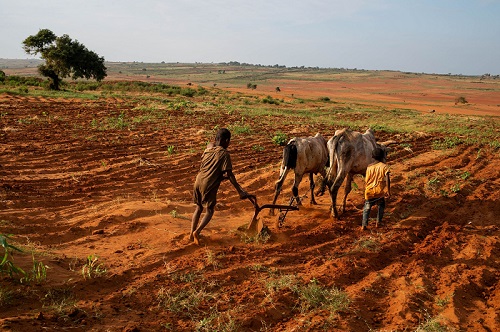
As a vast Indian Ocean island renowned for its remote beauty and unique ecosystem, Madagascar is sometimes referred to as the eighth continent. But the problems it faces now are “catastrophic,” according to WFP — and they are not primarily the result of local political or economic disorder, nor do they stem from isolated weather events.
“The big thing is there’s no conflict, but people are dying of hunger” in Madagascar, Lola Castro, who is WFP’s regional director in southern Africa and visited the worst-hit areas in June, told Today’s WorldView. The problem, Castro explained, was “clearly climate change.”
🐛🐜🦗 ❝In the morning, I prepare this plate of insects.
It’s been 8 months that my children and I have been eating this every day.❞🚨 More than 1.1 million people in southern #Madagascar are unable to feed themselves due to the country’s most acute #drought in 4 decades. pic.twitter.com/JUItQwGHjR
— WFP Africa (@WFP_Africa) June 24, 2021
Amid conflict and the coronavirus, many parts of the developing world face food crises. The WFP recently appealed for $6 billion to help 41 million people it says are on the edge of famine in 43 countries. The charity Oxfam has warned of a “hunger pandemic” even as the coronavirus still rages.
Many of the worst-hit countries are in sub-Saharan Africa. Amid the ongoing conflict in Ethiopia’s Tigray region, 900,000 people face famine conditions, according to U.S. estimates.
Violence has contributed to the threat of famine in South Sudan. Other areas seeing conflict, such as parts of Nigeria and Mozambique, are also seeing rising food insecurity.
But in Madagascar, it’s primarily another c-word that is causing problems: climate. The country’s south is suffering from its worst drought conditions recorded since 1981, as well as other problems such as cyclones, dust storms and even those locusts.
That a changing climate could cause this scale of problems in such a short period of time has global health bodies deeply worried.
WFP chief David Beasley, speaking at a Group of 20 event on humanitarian aid in Brindisi, Italy, on Wednesday, warned that Madagascar and countries like it could face an “unprecedented famine of biblical proportions” as he asked for $78.6 million to help get Madagascar through the lean season, which begins in the fall and lasts until the spring.
The situation in Madagascar comes as rising temperatures are causing new alarm in the United States. Parts of Oregon and Washington state have broken all-time temperature records by large margins, while Canada has also shattered its hot-weather records.
In British Columbia, there have been warnings of a surge in deaths thought to be linked to the heat. And as Today’s WorldView wrote this week, North America is just one place seeing record temperatures: The Middle East, South Asia and Russia are all seeing their own spikes.
Weather patterns in southern Madagascar, too, have been upended by a shifting climate. A lack of consistent rainfall has been the worst effect, with five of the last six rainy seasons in the country bringing below-average rainfall.
This has led to failed harvests and underfed livestock, with farmers forced to sell off what they had to buy food to provide for their families.
There are increasing dust storms — known as tiomena to the locals — and locust swarms, once a rare occurrence, are now regularly devastating crops. In May, the Guardian’s Kaamil Ahmed and Rivonala Razafison spoke to Jean-Louis Tovosoa, a father of 15 who lives in the affected area.
“Over the five last years, tiomenas have become more and more frequent. They have been affecting a wide range of territory. There were no rains over the three last years,” Tovosoa told them. “Because of the persistent drought, violent winds have swept away the good soil for cultivation.
“They have killed the cactus plants, which are vital for us in the time of famine. They have also destroyed crops and killed animals such as zebus [cattle], sheep and goats,” he added.
The WFP is hoping to provide short-term supplies to people like Tovosoa, but also help southern Madagascar adapt to the realities of its new climate. The long-term plan may involve irrigation, Castro, the regional director, said, but also may require new types of crops and cattle.
The pandemic is still raging in Africa, and the delta variant is on the rise. Meanwhile, lingering conflict in Tigray threatens to spill into a broader battle involving not just Ethiopia but Eritrea, too, while refugees have poured into Sudan. Amid these pressing challenges, it may be tempting to view climate change as a problem to be dealt with later.
But crises caused by climate change beget other crises. Though Madagascar is relatively peaceful, it has struggled with conflict and ethnic divisions in the past. And children are being pulled out of education as food becomes scarce.
Meanwhile, food prices are rising around the world, according to the United Nation’s Food and Agriculture Organization, thanks in large part to a combination of trade pressure, covid-19 and climate problems.
Global #foodprices rose rapidly in May reaching the highest value since Sept 2011, even as world cereal production is on course to reach a new record high.
A surge in the intl prices of vegetable oils, sugar and cereals led the increase.
More: https://t.co/TSbd1Y1axR pic.twitter.com/WoZJUorjV3— FAO Newsroom (@FAOnews) June 3, 2021
“What we are seeing now in southern Madagascar is just the tip of the iceberg,” Castro said. Other countries will probably also see the fallout of a confluence of climate change, conflict and covid-19 in the coming months.
“We should expect something like this in Angola. We should expect something like this for north Mozambique,” Castro added. “We should expect these things to start coming up with a small focus initially and then expanding — unless we crush them.”










